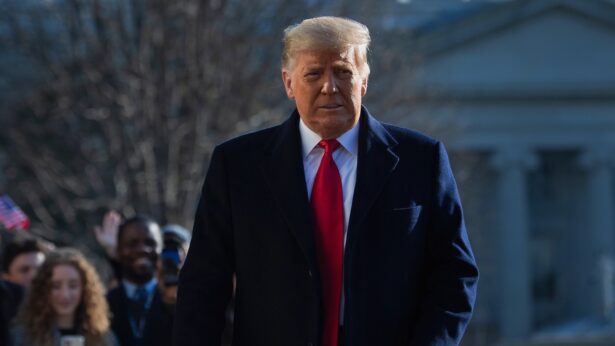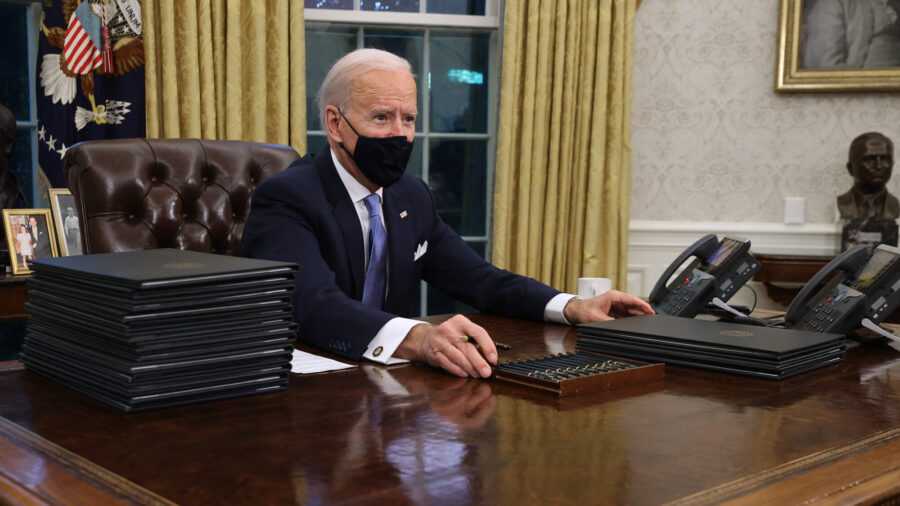In one of his first executive actions on Jan. 20, President Joe Biden rescinded President Donald Trump’s travel ban on nations with individuals posing a terrorist threat to the United States.
In a proclamation titled “Ending Discriminatory Bans on Entry to the United States,” Biden revoked a series of executive orders and proclamations Trump signed between 2017 and 2020.
Similar to the establishment media and groups that challenged Trump’s actions, Biden accused his predecessor of discriminating against Muslims and African nations. Trump’s actions targeted a small portion of majority-Muslim and African countries.
“The United States was built on a foundation of religious freedom and tolerance, a principle enshrined in the United States Constitution,” the proclamation states. “Nevertheless, the previous administration enacted a number of Executive Orders and Presidential Proclamations that prevented certain individuals from entering the United States—first from primarily Muslim countries, and later, from largely African countries.”
The countries affected by the travel ban prior to Biden’s revocation were Eritrea, Iran, Kyrgyzstan, Libya, Myanmar, Nigeria, North Korea, Somalia, Sudan, Syria, Tanzania, Venezuela, and Yemen.

Trump issued the first version of the travel ban on Jan. 27, 2017. The ban was met with protests and blocked by the courts. The White House redrafted the order to insulate it from legal challenges and issued the new directive on March 6, 2017. Implementation of the second order was delayed by court challenges. In September 2017, Trump issued a proclamation modifying the order, which, after a legal battle, was upheld by the U.S. Supreme Court.
In April 2018, Trump removed Chad from the list of the blocked countries. Last year, he added Eritrea, Kyrgyzstan, Myanmar, Nigeria, Sudan, and Tanzania due to their failure to share “terrorist, criminal, or identity information” for their travelers.
Establishment media outlets labeled the move as a “Muslim ban” due to the proportion of Muslims living in each country. The parties that challenged the order in court argued that the measure was motivated by an anti-Muslim animus. The administration disagreed, pointing out that more than 40 Muslim-majority countries were not included in the ban.
In 2020, radical Islamic terrorists killed 10,125 people and injured 7,725 as part of more than 2,100 terror acts, according to a list maintained by The Religion of Peace, a non-partisan website that has tracked Islamic terrorism attacks around the world since 2001.
Last year, in the countries affected by Trump’s travel ban, radical Islamic terrorists killed 3,283 people, accounting for nearly one-third of all Islamic terror killings worldwide.
Some of the countries on the blacklist have little to no Islamic terror attacks domestically but were added for other reasons. Travel from Iran was banned because the nation is considered by the U.S. State Department to be the world’s leading sponsor of terrorism. Countries, like Somalia, have had no government for decades to issue basic documents like birth certificates and driver licenses, making it impossible to vet travelers. Other nations have active extremist militias, are suffering from active civil wars, and are home to terrorist groups like Al Qaeda.
“The Trump travel ban fixed a real-world security problem, which is vetting visa applicants from countries that have no governments to help us do it,” Todd Bensman, a senior national security fellow and the Center for Immigration Studies, told The Epoch Times. “If you simply just ban travel from those places, you don’t have to worry. It fixes the problem at its root, which is you don’t have to investigate the backgrounds of people who are coming from those places.
“Reversing it means we’re going to be right back to square one with all sorts of nefarious characters being given visas that we have to prosecute on terrorism charges. Quite a list of people from Somalia and Yemen and Sudan and Syria who got it under visas before the ban that turned out to be terrorists, hardcore terrorists,” Bensman added.
In an apparent attempt to assuage concerns about the vetting issues, Biden’s proclamation includes a section titled “Review of Information-Sharing Relationships and a Plan to Strengthen Partnerships.”
The order directs the secretaries of State and Homeland Security to provide a report to the president in 120 days that provides “a description of the current screening and vetting procedures,” “a review of foreign government information-sharing practices,” “recommendations to improve screening and vetting activities,” and “a review of the current use of social media identifiers in the screening and vetting process.”
From The Epoch Times

